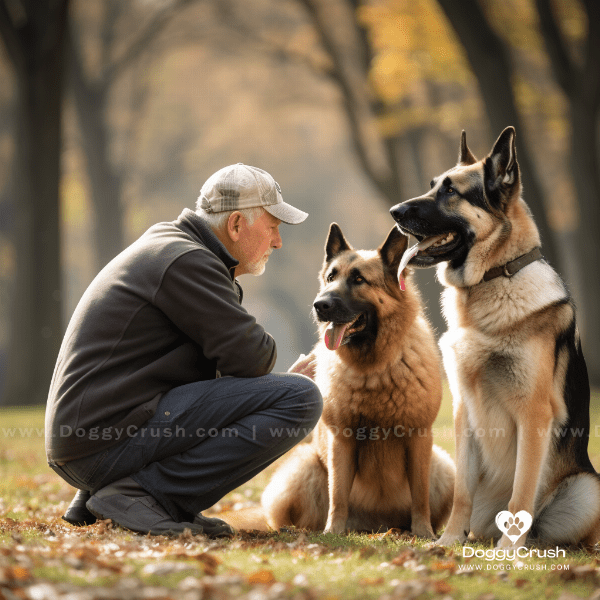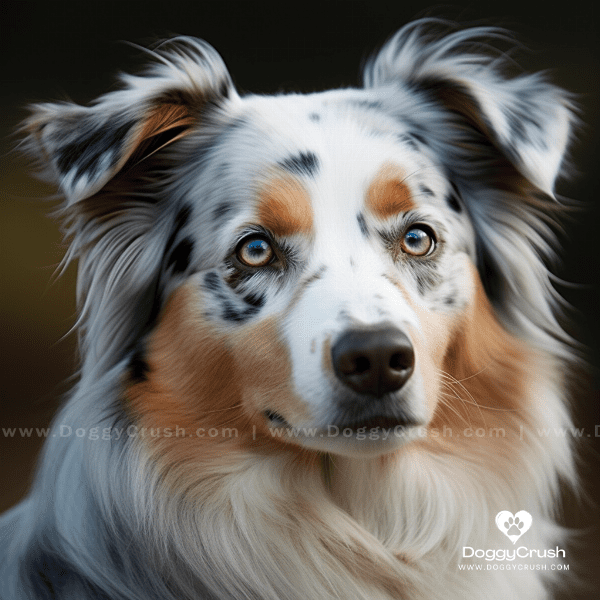Table of Contents
- The History and Origin of German Shepherd Dogs
- Characteristics and Physical Features of German Shepherd Dogs
- The Different Types of German Shepherd Dogs
- Understanding the Temperament and Personality of German Shepherd Dogs
- Training German Shepherd Dogs: Tips and Techniques
- Proper Nutrition and Health Care for German Shepherd Dogs
- Grooming and Maintenance for German Shepherd Dogs
- German Shepherd Dogs and Their Role in Law Enforcement
- Common Misconceptions About German Shepherd Dogs
- Finding and Choosing the Right German Shepherd Dog for You
The History and Origin of German Shepherd Dogs
German Shepherd Dogs, also known as GSDs, have a rich and fascinating history that dates back to the late 19th century. Captain Max von Stephanitz, a German cavalry officer, is credited with creating the breed by crossbreeding various herding dogs to create a dog with a distinctive appearance and excellent working abilities.
Early Beginnings
In the late 1800s, Germany was undergoing a transformation in its economy and agriculture. There was a growing need for herding dogs that could work efficiently in large groups and cover long distances. Stephanitz became fascinated by these dogs and began attending dog shows and studying the different breeds.
The Founding of the Breed
In 1899, Stephanitz purchased a dog named Hektor Linkrshein, who he believed had the ideal characteristics he was looking for. Hektor became the foundation of the breed that would later become known as the German Shepherd Dog. Stephanitz established the Verein für Deutsche Schäferhunde (Society for the German Shepherd Dog) in 1899 and began to develop and refine the breed.
The Rise of the Breed
In the early 20th century, German Shepherd Dogs quickly gained popularity not only in Germany but also throughout Europe and the United States. Their intelligence, loyalty, and working abilities made them ideal for police and military work, as well as search and rescue operations.
World War II and Beyond
During World War II, German Shepherd Dogs were used extensively by the German military, and many were killed in action. After the war, the breed faced a decline in popularity due to its association with the German military. However, breeders in other countries continued to work with the breed and develop its potential as a family pet and working dog.
Today, German Shepherd Dogs are one of the most popular breeds in the world and are used in a variety of roles, including police and military work, search and rescue, and as family pets. Their history and origin make them a unique and beloved breed, with a rich legacy that continues to this day.
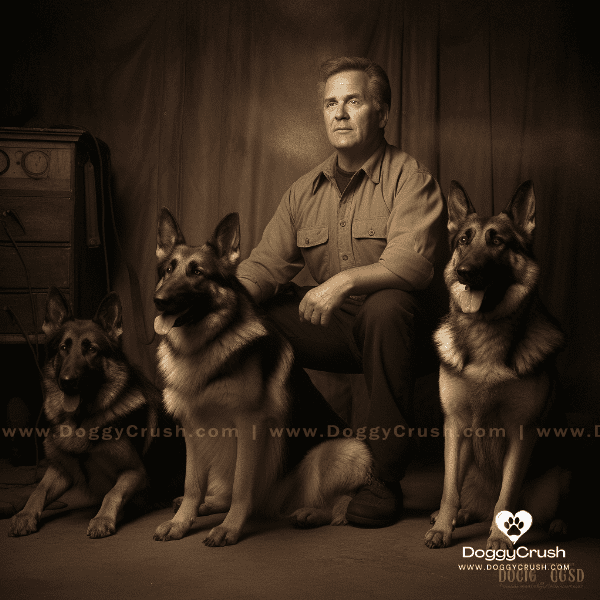
Characteristics and Physical Features of German Shepherd Dogs
German Shepherd Dogs are a breed known for their distinctive appearance and impressive working abilities. They have several unique physical features that set them apart from other breeds, as well as personality traits that make them beloved family pets.
Size and Build
German Shepherd Dogs are a large breed, typically weighing between 50 to 90 pounds and standing 22 to 26 inches tall at the shoulder. They have a muscular build and a sturdy, athletic physique that allows them to excel at a variety of physical tasks.
Coat and Color
The German Shepherd Dog has a thick, double coat that provides excellent insulation in both hot and cold weather. Their coat can be either short or long, with a straight or slightly wavy texture. The breed comes in a variety of colors, including black, sable, and bi-color.
Head and Face
The head of a German Shepherd Dog is one of its most distinctive features, with a strong, noble appearance that exudes intelligence and confidence. Their face has a slightly tapered shape, with erect ears that stand straight up and alert eyes that convey a keen sense of awareness.
Personality and Temperament
In addition to their physical features, German Shepherd Dogs are known for their loyal and intelligent personalities. They are highly trainable and eager to please, making them ideal for a variety of working roles. They are also affectionate and protective of their families, making them excellent family pets.
Exercise and Training Needs
German Shepherd Dogs have high exercise and training needs, and they thrive in environments that provide plenty of mental and physical stimulation. They require regular exercise and training to prevent boredom and destructive behavior. Owners of German Shepherd Dogs should be prepared to provide their pet with plenty of opportunities for exercise and training.
In conclusion, German Shepherd Dogs are a unique breed with a distinctive appearance and impressive working abilities. Their physical features and personalities make them beloved family pets, and their intelligence and loyalty make them ideal for a variety of working roles. Owners of German Shepherd Dogs should be prepared to provide their pet with plenty of exercise and training to ensure their well-being and happiness.
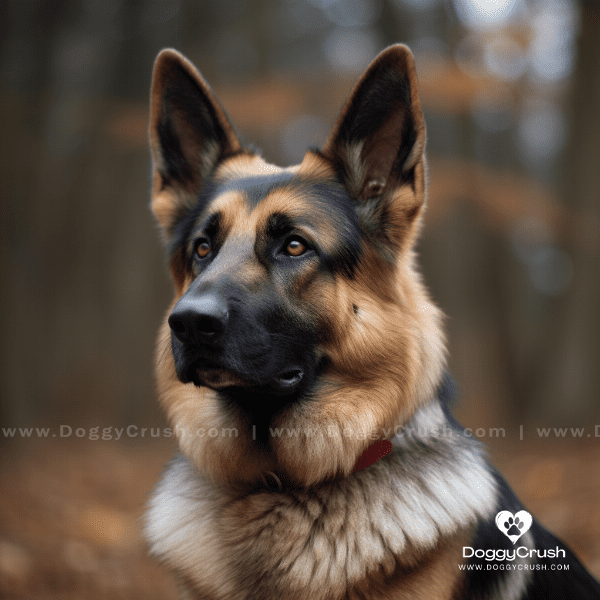
The Different Types of German Shepherd Dogs
German Shepherd Dogs come in a variety of types, each with unique characteristics and traits that set them apart from each other. These types have been developed over time through selective breeding, and each has its own specific purpose and strengths.
Show Line German Shepherds
Show line German Shepherds are bred for their appearance and conformation to breed standards. They are known for their good looks and elegant movement, with a sloping back and a more delicate frame than other types of German Shepherds. Show line German Shepherds are typically not as well-suited for working roles as other types of the breed.
Working Line German Shepherds
Working line German Shepherds are bred for their working abilities, with a focus on traits such as intelligence, courage, and stamina. They are often used in police and military work, as well as search and rescue operations. Working line German Shepherds have a more muscular build and a straighter back than show line dogs.
Czech Working Line German Shepherds
Czech Working Line German Shepherds are a specific type of working line dog that originated in the Czech Republic. They are known for their high drive and excellent working abilities, with a focus on traits such as agility, speed, and athleticism. Czech Working Line German Shepherds are often used in police and military work, as well as search and rescue operations.
American Show Line German Shepherds
American Show Line German Shepherds are a specific type of show line dog that has been developed in the United States. They are known for their good looks and gentle temperament, with a focus on breeding for beauty rather than working ability. American Show Line German Shepherds are often used as family pets due to their friendly and affectionate personalities.
In conclusion, German Shepherd Dogs come in a variety of types, each with its own unique characteristics and traits. Show line German Shepherds are bred for their appearance, while working line German Shepherds are bred for their working abilities. West German Show Line and Czech Working Line German Shepherds are specific subtypes of these categories, while American Show Line German Shepherds have been developed in the United States. Owners should consider their needs and preferences when choosing a type of German Shepherd Dog, as each has its own strengths and weaknesses.
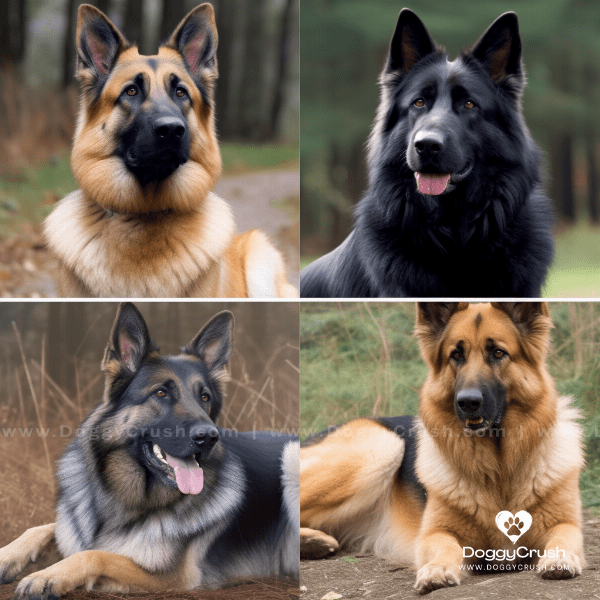
Understanding the Temperament and Personality of German Shepherd Dogs
German Shepherd Dogs are known for their loyal and intelligent personalities, but they also have specific temperaments and personalities that make them unique. Understanding these traits is important for owners to provide their pets with proper care and training.
Loyalty
German Shepherd Dogs are famously loyal to their families, often forming deep bonds with their owners. They are protective of their loved ones and will go to great lengths to keep them safe. This loyalty can make them excellent guard dogs, but it also means that they may become anxious or distressed when separated from their owners for long periods of time.
Intelligence
German Shepherd Dogs are highly intelligent and trainable, which is one reason why they are used in police and military work. They have a natural desire to please their owners, which makes them eager to learn new commands and behaviors. However, their intelligence also means that they require plenty of mental stimulation to prevent boredom and destructive behavior.
Confidence
German Shepherd Dogs are confident and assertive, with a strong sense of self. They are not easily intimidated and will defend themselves and their families if necessary. This confidence can make them excellent working dogs, but it also means that they require proper socialization and training to prevent aggressive or fearful behavior.
Playfulness
German Shepherd Dogs have a playful side, and they enjoy interacting with their owners and playing games. They have a natural curiosity and enjoy exploring their environment. However, their playfulness should be channeled into appropriate activities to prevent destructive behavior.
Sensitivity
Despite their confident and assertive personalities, German Shepherd Dogs can also be sensitive to their surroundings and the emotions of their owners. They may become anxious or stressed in unfamiliar environments or when their owners are upset. Proper socialization and training can help to mitigate these issues.
In conclusion, German Shepherd Dogs have unique temperaments and personalities that make them beloved family pets and working dogs. Owners should be aware of these traits and provide their pets with proper care and training to ensure their happiness and well-being. Understanding the loyalty, intelligence, confidence, playfulness, and sensitivity of German Shepherd Dogs is essential for providing them with a fulfilling and happy life.
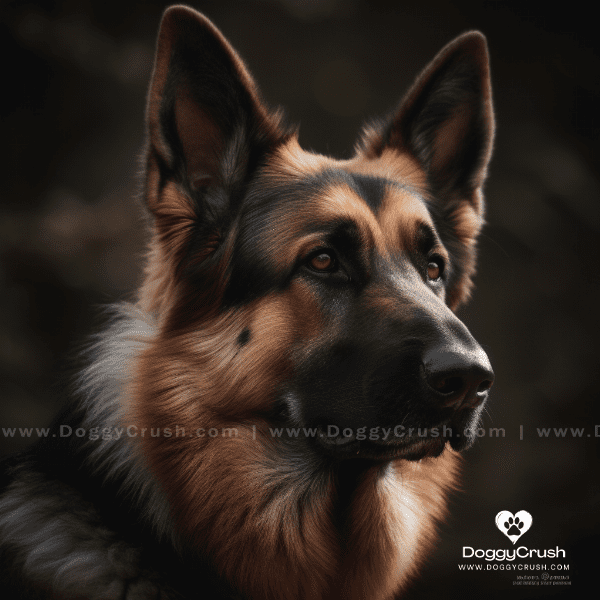
Training German Shepherd Dogs: Tips and Techniques
German Shepherd Dogs are highly intelligent and trainable, which makes them ideal for a variety of working roles and as family pets. However, they also have specific training needs that should be addressed to ensure their well-being and happiness. Here are some tips and techniques for training German Shepherd Dogs:
Start Early
It’s important to start training your German Shepherd Dog at a young age to establish good habits and prevent bad ones from forming. Puppies are like sponges, and they will absorb everything you teach them, so make sure to start with basic commands and socialization as early as possible.
Use Positive Reinforcement
German Shepherd Dogs respond well to positive reinforcement, which involves rewarding good behavior rather than punishing bad behavior. Use treats, praise, and playtime to reward your dog when they perform a desired behavior, such as sitting or staying. This will encourage them to repeat the behavior in the future.
Be Consistent
Consistency is key when it comes to training German Shepherd Dogs. Make sure that everyone in your household is on the same page and uses the same commands and techniques. This will prevent confusion and ensure that your dog understands what is expected of them.
Provide Plenty of Exercise and Stimulation
German Shepherd Dogs have high exercise and stimulation needs, so it’s important to provide them with plenty of opportunities to play and explore. Take your dog for regular walks, play games with them, and provide them with puzzle toys and other mental stimulation activities.
Consider Professional Training
If you’re having difficulty training your German Shepherd Dog or if you’re looking to train them for a specific role, such as police work or search and rescue, consider working with a professional trainer. They can provide specialized training and advice tailored to your dog’s needs.
In conclusion, German Shepherd Dogs are highly trainable and intelligent, but they also have specific training needs that should be addressed to ensure their well-being and happiness. Starting early, using positive reinforcement, being consistent, providing plenty of exercise and stimulation, and considering professional training are all important tips and techniques for training German Shepherd Dogs. By following these guidelines, you can help your German Shepherd Dog reach their full potential as a working dog or beloved family pet.
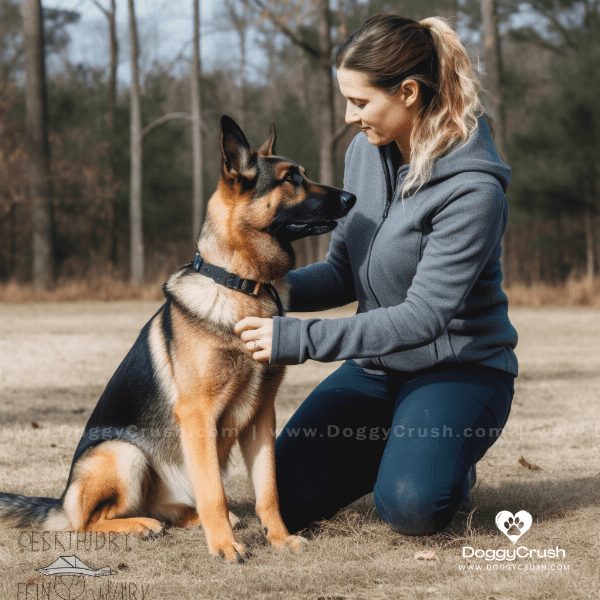
Proper Nutrition and Health Care for German Shepherd Dogs
German Shepherd Dogs have specific nutritional and health care needs that should be addressed to ensure their overall well-being. Here are some tips for providing proper nutrition and health care for German Shepherd Dogs:
Feeding
German Shepherd Dogs require a high-quality diet that is rich in protein and essential nutrients. They are prone to hip and joint problems, so it’s important to feed them a diet that supports healthy bones and joints. Avoid overfeeding, as this can lead to obesity and related health problems.
Exercise
Regular exercise is important for maintaining the health and fitness of German Shepherd Dogs. They require at least 30 minutes of exercise each day, and more is recommended for working dogs. Exercise can include walking, running, swimming, and playing games such as fetch or Frisbee.
Grooming
German Shepherd Dogs require regular grooming to maintain their thick double coat. Brushing once or twice a week will help to prevent matting and shedding. They also require regular nail trimming, ear cleaning, and dental care.
Health Care
Regular visits to the veterinarian are important for ensuring the overall health of German Shepherd Dogs. They require routine vaccinations, flea and tick prevention, heartworm prevention, and dental cleanings. They are also prone to certain health issues, such as hip dysplasia, so it’s important to be aware of these and take preventive measures when possible.
Hydration
German Shepherd Dogs require access to fresh, clean water at all times. They are prone to overheating, especially during hot weather, so it’s important to provide them with plenty of water to prevent dehydration.
In conclusion, proper nutrition and health care are essential for the overall well-being of German Shepherd Dogs. Feeding a high-quality diet, providing regular exercise and grooming, and seeking regular veterinary care are all important factors in maintaining their health. By following these guidelines, you can help your German Shepherd Dog live a healthy, happy life.
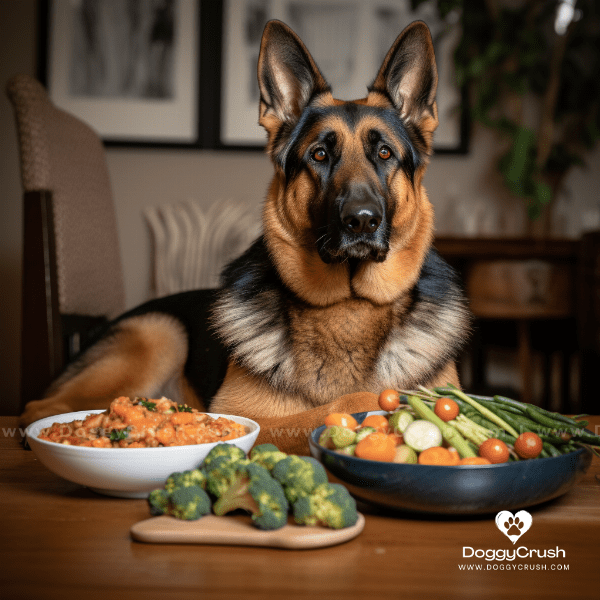
Grooming and Maintenance for German Shepherd Dogs
German Shepherd Dogs have a thick double coat that requires regular grooming and maintenance to keep it healthy and looking its best. Here are some tips for grooming and maintaining German Shepherd Dogs:
Brushing
German Shepherd Dogs should be brushed at least once a week to remove loose hair and prevent matting. Use a slicker brush or undercoat rake to reach the dense undercoat and a comb to remove any tangles.
Bathing
German Shepherd Dogs should be bathed as needed, but not too often as this can strip their coat of natural oils. Use a gentle dog shampoo and avoid getting water in their ears.
Nail Trimming
German Shepherd Dogs’ nails should be trimmed regularly to prevent them from becoming too long and causing discomfort or injury. Use sharp dog nail clippers and avoid cutting the quick, which is the blood vessel inside the nail.
Ear Cleaning
German Shepherd Dogs’ ears should be cleaned regularly to prevent wax buildup and infection. Use a gentle dog ear cleaner and cotton balls to clean the outer ear.
Dental Care
German Shepherd Dogs are prone to dental issues, so it’s important to provide them with proper dental care. Brush their teeth regularly with a dog toothbrush and toothpaste, and provide them with dental chews or toys to help keep their teeth clean.
Check for Fleas and Ticks
German Shepherd Dogs are susceptible to fleas and ticks, so it’s important to check them regularly and use preventative measures such as flea and tick medication.
In conclusion, German Shepherd Dogs require regular grooming and maintenance to keep their coat and overall health in good condition. Brushing, bathing, nail trimming, ear cleaning, dental care, and checking for fleas and ticks are all important aspects of grooming and maintaining German Shepherd Dogs. By following these guidelines, you can help your German Shepherd Dog look and feel their best.

German Shepherd Dogs and Their Role in Law Enforcement
German Shepherd Dogs are often used in law enforcement due to their intelligence, loyalty, and working abilities. Here are some ways that German Shepherd Dogs play a role in law enforcement:
Police Work
German Shepherd Dogs are used by police departments around the world to assist in a variety of tasks, including tracking suspects, searching for evidence, and detecting drugs and explosives. They are trained to use their natural abilities, such as their sense of smell and hearing, to aid in investigations and arrests.
Search and Rescue
German Shepherd Dogs are also used in search and rescue operations to locate missing people or objects. They can cover large areas quickly and efficiently, and their keen sense of smell allows them to locate scents that humans may not be able to detect.
Military Work
German Shepherd Dogs have been used by military organizations around the world for many years. They are trained to assist in a variety of tasks, including detecting explosives, tracking enemies, and providing security for troops.
Border Patrol
German Shepherd Dogs are often used by border patrol agents to detect illegal activity, such as smuggling or drug trafficking. Their ability to track scents and detect hidden objects makes them valuable assets in border security.
In conclusion, German Shepherd Dogs play an important role in law enforcement due to their intelligence, loyalty, and working abilities. They are used for a variety of tasks, including police work, search and rescue, military operations, and border patrol. German Shepherd Dogs are valued members of law enforcement teams and are highly respected for their skills and abilities.

Common Misconceptions About German Shepherd Dogs
German Shepherd Dogs are a popular breed, but they also have some common misconceptions that can lead to misunderstandings about their behavior and personality. Here are some of the most common misconceptions about German Shepherd Dogs:
German Shepherd Dogs are aggressive
One of the most common misconceptions about German Shepherd Dogs is that they are naturally aggressive. While they can be protective and assertive, they are not inherently aggressive. Like any dog, their behavior is shaped by their upbringing and environment.
German Shepherd Dogs are not good with children
Another common misconception is that German Shepherd Dogs are not good with children. While it’s true that they require proper socialization and training, German Shepherd Dogs can be excellent family pets and do well with children. They are loyal and protective, and they often form strong bonds with their owners’ children.
German Shepherd Dogs are high-maintenance
Some people believe that German Shepherd Dogs are high-maintenance and require a lot of time and attention. While they do require regular grooming and exercise, they are not more high-maintenance than other breeds. With proper care and attention, German Shepherd Dogs can make excellent pets.
German Shepherd Dogs are not good apartment dogs
Another misconception is that German Shepherd Dogs are not good for apartment living. While they do require regular exercise, they can adapt to living in smaller spaces if their exercise and mental stimulation needs are met.
German Shepherd Dogs are not good with other pets
Finally, some people believe that German Shepherd Dogs are not good with other pets. While they can be protective and territorial, with proper socialization and training, they can coexist peacefully with other pets in the household.
In conclusion, German Shepherd Dogs are a wonderful breed that can make excellent family pets and working dogs. However, it’s important to recognize and dispel common misconceptions about their behavior and personality. By understanding their true nature, we can appreciate them for the loyal and intelligent companions that they are.
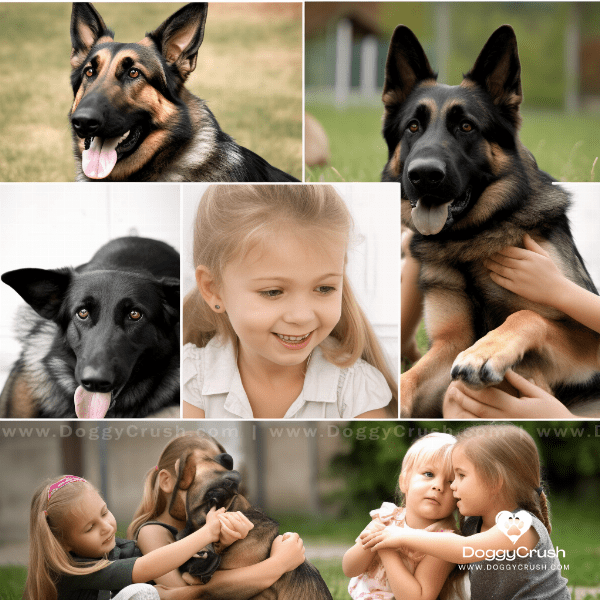
Finding and Choosing the Right German Shepherd Dog for You
German Shepherd Dogs can make wonderful pets, but it’s important to find the right dog for your lifestyle and needs. Here are some tips for finding and choosing the right German Shepherd Dog for you:
Research
Before getting a German Shepherd Dog, it’s important to do your research. Learn about the breed’s characteristics, temperament, and care requirements. This will help you determine if a German Shepherd Dog is the right choice for you.
Consider Your Lifestyle
German Shepherd Dogs require regular exercise and mental stimulation, so it’s important to consider your lifestyle when choosing a dog. If you are an active person who enjoys outdoor activities, a German Shepherd Dog may be a good fit. If you work long hours or have limited time for exercise, a different breed may be a better choice.
Consider Age and Training
When adopting or purchasing a German Shepherd Dog, consider their age and level of training. Puppies require more time and attention for training and socialization, while older dogs may already have some training and be calmer. Decide which option is best for your lifestyle and needs.
Find a Reputable Breeder or Rescue Organization
It’s important to find a reputable breeder or rescue organization when getting a German Shepherd Dog. A reputable breeder will provide you with information about the dog’s health and temperament, and will not sell puppies to just anyone. Rescue organizations can provide you with information about the dog’s background and temperament, and will work to ensure that the dog is a good fit for your family.
Meet the Dog Before Adopting or Purchasing
Before adopting or purchasing a German Shepherd Dog, it’s important to meet the dog in person. This will give you an opportunity to observe their behavior and temperament, and to see if they are a good fit for you and your family.
In conclusion, finding and choosing the right German Shepherd Dog for you requires research, consideration of your lifestyle, age and training, finding a reputable breeder or rescue organization, and meeting the dog before adopting or purchasing. By following these guidelines, you can ensure that you find a German Shepherd Dog that is a good fit for you and your family, and that you provide them with the love and care they deserve.
